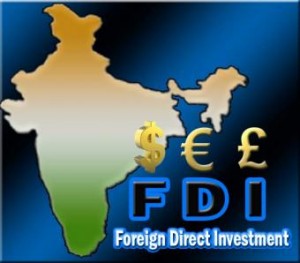In this blog post, Aditya Kumar, who is currently pursuing a Diploma in Entrepreneurship Administration and Business Laws from NUJS, Kolkata, examines some of the significant change, which have been made to the Consolidated Foreign Direct Investment Policy, 2015 (FDI Policy).
The FDI Policy is published each year by the Department of Industrial Policy and Promotion (“DIPP”), Ministry of Commerce and Industry and is updated from time to by the DIPP through press notes that are issued as amendments to the FDI policy.
The year 2015-16 saw some significant changes to the FDI Policy and the following are the important developments for the year 2015-16:
- Publication of guidelines for FDI in E-Commerce.
- Liberalization of FDI in the pension sector.
- Liberalization of FDI in the insurance sector.
Publication of guidelines for FDI in E-Commerce
The guidelines issued by the DIPP regarding the treatment of e-commerce companies in India (“E-Commerce Guidelines”) such as Amazon, Flipkart, Snapdeal etc. has been a subject OF much discussion since the guidelines were issued. There has been a lot of debate about the impact of these changes and how exactly how the different stakeholders including e-commerce companies and the consumers will be affected by this change.
What do the E-Commerce Guidelines provide?
- Definition of e-commerce: The E-Commerce Guidelines define an e-commerce as the “buying and selling of goods and services including digital products over digital and electronic network”.
- Areas where FDI is permitted: The E-Commerce Guidelines provide that 100% FDI is permitted under the automatic route in a marketplace model e-commerce and prohibits FDI in the inventory based model of FDI. This clarifies further that e-commerce companies such as Amazon and Flipkart are meant to pure marketplaces and therefore these entities are prohibited from owning the inventory of goods and services that is finally sold to the customers.
- Other important conditions: There are a number of additional conditions that have been provided for in E-Commerce Guidelines, this post however will only focus on some of the more significant conditions.
- Cap on vendor sales: The E-Commerce Guidelines provides that no e-commerce company is permitted to allow any single vendor or its group companies to sell more than 25% of the e-commerce entities total sales. This restriction has provided SOME serious issues for e-commerce companies to deal with as companies such as Flipkart and Amazon which primarily sell most of the products on their platform using a single major vendor that easily exceeds this 25% threshold. The original intension behind this condition is to ensure that the distinction between vendors and marketplaces such as Amazon is maintained and that FDI is only used to fund the marketplace model of e-commerce companies and not the vendors that supply goods to them. The corollary however is that such a guideline may force the e-commerce companies to act in a non-economically efficient manner. For example, if a vendor does sell more than the limit specified in the norms due to the sellers on time delivery, quality of the product etc., then e-commerce companies will be forced to reduce the amount of sales that emanate from this efficient vendor and instead diversify their vendors who may not provide the same sort of service or goods. In such a scenario, the ultimate victim would be the consumer who is deprived of a quality product.
- Influencing sale price: The E-Commerce Guidelines restricts e-commerce companies from directly or indirectly influencing the price of the goods or services that are offered on their platform. This means that the massive sales that are offered by e-commerce companies may see a decline in the future. There are already examples of e-commerce companies delaying or cancelling plans for a sale since they may be found in violation of this condition.
Liberalization of FDI in the pension sector
The Government of India liberalized FDI up to 49% under the automatic route in the pension sector. As per the guidelines, foreign investment is allowed in the pension sector subject to the following conditions:
- The foreign investment is allowed as per the Pension Fund Regulatory and Development Authority (PFRDA) Act, 2013.
- Whenever the foreign investment involves control or ownership by the foreign investor or transfer of control and ownership of an existing pension funds from resident Indian citizens and/or Indian companies owned and controlled by resident Indian citizens to such foreign investing entities, government approval would be required. The meaning of ownership and control has been provided for in the FDI policy which states that “control” includes “the right to appoint a majority of the directors or to control the management or policy decisions including by virtue of their shareholding or management rights or shareholders agreements or voting agreements”.
Liberalization of FDI in the insurance sector
- The Government of India liberalized FDI in the insurance sector by permitting up to 49% foreign investment under the automatic route in the insurance sector including:
- Insurance Companies
- Insurance Brokers
- Third party administrators
- Surveyors and loss assessors
- Other insurance intermediaries appointed under the provision of the Insurance Regulatory and Development Authority Act, 1999.
- There are a number of additional conditions that have been provided for in case of such investment, however this post will only focus on some of the more significant conditions detailed below:
- An Indian insurance company is required to ensure that ownership and control remains in the hands of resident Indian entities.
- The foreign investment up to 49% will be subject to verification by the Insurance Regulatory and Development Authority.
 Serato DJ Crack 2025Serato DJ PRO Crack
Serato DJ Crack 2025Serato DJ PRO Crack











 Allow notifications
Allow notifications


